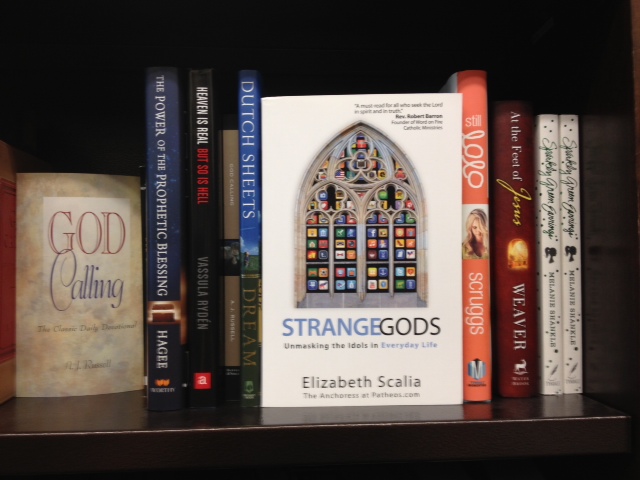Last night, I logged off fairly early and missed a big donnybrook on Facebook that had to do with people angry at me because of this piece from yesterday. Lots of namecalling and screaming in my direction, mostly because I dared to find anything worthwhile in Obama’s speech, even as I identified it as a cynical move to divert attention away from his awful presidency.
Apparently my near-constant criticisms of the man since 2007 were insufficient bona fides to allow me one instance of (mild) praise, before I called him cynic. So it goes. In our brave new world, things have become very narrow, indeed. A few Patheos bloggers tried to defend me as “not” being “crazy” but that’s always been a near-thing in my case so their efforts, though appreciated, were gallant kamikaze missions.
A friend who had witnessed the thing sent me an email this morning asking if I’d seen it, and hoping I’d not been hurt.
I wanted to answer like Tracy Jordan, on 30 Rock: “Please, you can’t hurt me. I’ve done stand-up. I once had an audience throw a motorcycle at me.”
But instead I wrote, “Nah, that guy had just made an idol of his issue and was being an idolator to his hate. You’d be amazed at how freeing it is to ponder things in light of idolatry. When you realize what someone else is serving, it doesn’t touch you at all.”
Like making good use of the confessional, making use of that realization is worth a couple of years of therapy bills, I think. We all have the ability to get down on ourselves, and if we’re honest, we all do things that deserve some critical introspection. Sometimes we earn the disapprobation of others, as well; we get a stern talking-to, and it is worth heeding. But there are other times — particularly when emotionalism is clearly entering into things (and namecalling is a good clue about that) — where one needs to be detached and balanced enough to understand that something else is going on that really has nothing to do with us, and so we can just kiss it up to God and move on.
Once again, God has given us all we need, if we only utilize it, in this case, with his very first commandment.
When someone is screaming at me that I am insane (or calling me a name) simply because my perspective is different, very often their idol and ego are what is really being catered to. Likewise, when someone is passive-aggressively sowing seeds of division under the guise of “worrying” about me for having a different point of view. In both cases, the person is serving something within himself or herself, and I can just put all of that in God’s hands and let it roll off the shoulder.
“It’s not about you” is a good balancing tool, whether we use it to detach from our own idols or someone else’s.
This is from my book, Strange Gods; Unmasking the Idols in Everyday Life:
It is interesting to ponder for a moment both the order of the Ten Commandments and Jesus’s famous sermon. While it is certainly the case that all the sins warned against in the Decalogue are serious, there does seem to be a bit of a hierarchy to them. Murder is a crime against God and humanity, and it is obviously a pretty big deal—certainly a bigger deal than coveting your neighbor’s donkey. And yet, this is not the first or second or even the third commandment. It’s not even the first “You shall not.” The warning against strange gods is the first of those. Neither the greatest commandment nor the Sermon the Mount present things like murder as root sins. The true roots of sin, the roots that grow into actions like murder, are seeded within the mind, which is where idolatry always begins.
No idol is constructed in the act of murder. Rather, the murder is, at its end, an offering to an idol. The real idol is the enlarged anger within us, and it forms through our willingness to sustain an idea about our righteousness and, therefore, an idea about ourselves. We cling to a resentment or feed a jealousy until it grows into something we burnish daily with our justifications. We get it to glitter in our minds like something alive, like a genuine force outside of ourselves. We go so far as to proselytize our grudges to others through spin, gossip, and even lies — see my anger, my resentment, my jealousy, and my spite! Acknowledge it with me; let us have communion in our shared umbrage! Worship me with me! The great evil of murder, then, is the fruit of the idolatry that is first an idea, and the idea is almost always about the self:
o I am angry because I have been disrespected.
o I resent her success while my efforts are ignored.
o He hurt someone I love; I will have vengeance.
o I am afraid of this; I am better than that.
o I . . . I . . . IEven if the murderous thought lasts for but an instant, allowing it — and a thousand ideas like it — can be compared to shaking dandelion fluff. It is visually gratifying to let the wispy seedlings blow about, but eventually weeds take root.
An idea — a thought alone, Jesus warns us — is sufficiently evil to lead us astray, to keep us from loving God with our whole heart and mind and soul. Jesus says that to look on another with lust is the same as committing adultery. How? Because the actual act of commission is the mere end product; it is the sacrifice to the luminous image in our own mind’s eye: the image of the pretty girl that craves me; the image of the hunky man being available for me; the image of the ideal object of desire actually wanting me, which makes me ideal as well. It makes me perfect and like a god. Objectifying another (whether we do so in lust or in anger) is a key component to idolatry, but that object is most often not the idol. Oftentimes, the strange god placed before the Creator is myself.
Dare I say it? Heh, yeah: Read the whole thing.













